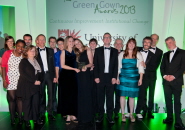
Northeast (NE) India is more than just a region on the map; it is a treasure trove of beautiful
natural landscapes and ecological wealth that plays an essential role in our planet’s health. As
we celebrate World Environment Day 2024 with the theme of restoration, let us highlight the
ecological richness of Assam and the other Northeastern states of India. From the slopes of
Arunachal Pradesh to the lowlands of Assam, the NE region is a biodiversity hotspot, home to
unique species found nowhere else on Earth. The more we explore this ecological richness,
the more we discover the wonders and mysteries it holds, sparking our curiosity and interest.
The scenic landscapes of the NE region exemplify a dynamic and harmonious relationship
between humans and nature. Indigenous communities here have cultivated a profound
repository of traditional ecological knowledge passed down through generations. The Bodos,
Mishings, Karbis, Nyishis, Angamis, Khasis, and many others have developed a deep-rooted
understanding of their natural surroundings through intimate interactions with forests, rivers,
and mountains.
One of the most remarkable aspects of this traditional wisdom is the extensive knowledge of
local plants and their uses. These communities have identified and utilized numerous plant
species for food, medicine, shelter, and rituals, demonstrating a profound understanding of
the ecological roles of each species. For instance, the Bodos have long made use of medicinal
plants like Bhut Jolokia (ghost chili) for their therapeutic properties, contributing to the
preservation of traditional healing practices. This knowledge not only highlights the ecological
and cultural diversity of the region but also supports sustainable development and
conservation efforts.
Beyond plant knowledge, these communities have developed sophisticated ecosystem
management practices. Indigenous forest management practices in NE India have
significantly contributed to maintaining biodiversity hotspots and preserving wildlife habitats.
Traditional agroforestry systems, such as jhum cultivation practiced by the Karbi and Khasi
tribes, have shown resilience to climate variability while supporting local livelihoods. According
to a recent United Nations report, indigenous peoples’ territories encompass about 80% of the
world’s remaining biodiversity, underscoring the importance of their stewardship in
conservation efforts.
The wisdom of the hills and valleys also embodies resilience—a capacity to adapt and thrive
amidst changing circumstances. Indigenous communities have overcome challenges like
floods, droughts, and shifting climates by drawing on their deep ecological knowledge.

According to the Indian State Forest Report 2021, Assam’s forest cover is around 35% of its
geographical area, highlighting its critical role in biodiversity conservation and carbon
sequestration. However, this forest cover is declining, and the region faces environmental and
climate challenges, including deforestation, riverbank erosion, and climate change impacts.
Preserving and promoting traditional ecological knowledge is crucial in the face of the global
climate crisis. According to UNESCO, indigenous communities’ traditional knowledge
significantly contributes to the sustainable management of natural resources, benefiting both
local communities and global biodiversity. Recognizing, valuing, and supporting these
practices are essential for environmental conservation, cultural identity, and community
resilience.
Celebrating the wisdom of Assam and Northeast India’s hills and valleys on World
Environment Day reminds us of the transformative power of indigenous knowledge.
Integrating their insights into broader restoration efforts can contribute to building a sustainable
future for all. By embracing the wisdom passed down through generations and augmenting it
with contemporary research and statistics, we, the #GenerationRestoration, can pave the way
toward ecological harmony and resilience in the years to come.
Let us change gears to the tea communities of the NE region. Assam also plays a vital role in
India’s tea production, boasting over 312 210 hectares of tea cultivation. These tea plantations
not only fuel the state’s economy but also hold significant cultural and ecological value. Assam
is among the world’s largest tea-producing regions, with an annual production of 500-700
million kilograms (Mkgs) of tea leaves. The tea industry employs a vast workforce and
supports livelihoods throughout the region, contributing significantly to India’s overall tea
production. The tea plantations in Assam are not only unique but also serve as a prime
example of the harmonious blend of agriculture and biodiversity conservation. The lush green
tea bushes are seamlessly intertwined with shade trees, providing a habitat for various birds
and insects. Assam’s tea is globally renowned for its robust flavor and represents a heritage
deeply rooted in the land and its ecosystems. However, climate and environmental changes
threaten these lush industries, impacting the ecological and socio-economic balance in the
region.

The government has launched several key initiatives to promote development, ecological
conservation, and socio-economic growth across the state. Notable initiatives include the
Assam Budget for Sustainable Development, Assam Tea Tribes Welfare Board, Jal Jeevan
Mission (Har Ghar Jal), Assam Arunodoi Scheme, Assam Green Mission, Assam Skill
Development Mission, and Assam Startup. Effective implementation of these programs aims
to address climate change, promote environmental conservation, and improve the overall
quality of life for the people of Assam. However, the success of these programs depends on
thorough execution at the grassroots level.
What unfolds in the remote corners of Assam reverberates across continents. The lessons
gleaned from this region—on biodiversity conservation, traditional knowledge integration, and
community-led resilience—are universal. They inform global discussions on sustainable
development, emphasizing the need for inclusive approaches that prioritize both people and
the planet.
This World Environment Day, let us heed the call of Northeast India—a call to action for
environmental engagement and climate action involving youth, communities, government
agencies, and non-profit organizations. The region’s youth must understand the challenges
facing their environment and take action to safeguard their communities and natural
surroundings amidst infrastructural growth and development for their own and future
generations. Climate mitigation and adaptation strategies tailored to the region’s unique
context are critical, including afforestation, sustainable agriculture, and flood management
solutions. Youth can lead the way in developing context-specific climate adaptation and
environment restoration strategies that respect local cultures and ecosystems. By immersing
themselves in environmental education, research, and activism, young students can amplify
their voices and influence decision-makers at all levels.
Assam and its neighboring states in India stand out as a distinctive and valuable addition to
the mosaic of Earth’s landscapes. They serve as a beacon of hope and possibility in our
collective journey toward planetary stewardship. The region’s unique natural heritage,
combined with its rich cultural and ethnic diversity, makes it an important site for scientific
research and cultural exchange. As we strive to better understand and protect our planet,
regions like Northeast India offer invaluable insights and opportunities for collaboration.
———————–
This blog is written by Dr Jagannath Biswakarma, School of Earth Sciences, University of Bristol, UK. jagannath.biswakarma@bristol.ac.uk.




